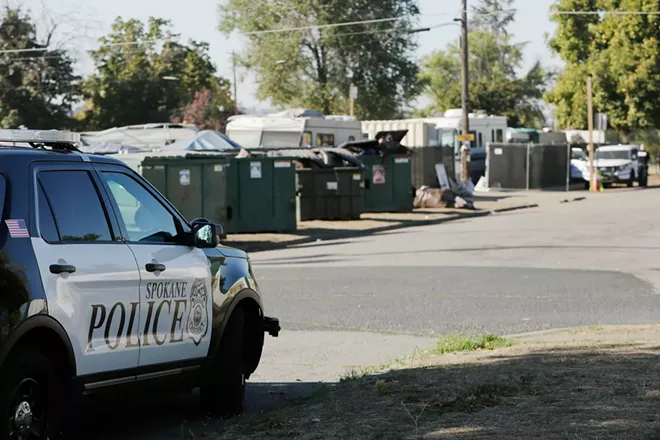
The legal strategy the City of Spokane used to successfully get Camp Hope declared a nuisance was simple: Portray the East Central homeless encampment as a den of drug use and crime. Argue that attempts by the Washington State Department of Transportation, which owns the land the camp is on, to impose order by having residents wear badges and increasing security had failed.
"Despite the fence, badge and curfew," the city said in its legal filing, "the camp was still lawless."
But affidavits from WSDOT and testimony from Camp Hope security members argued that things had genuinely improved and that the remaining disorder wasn't just because of the struggles that come with a homeless encampment. They also allege that police frequently refused to remove violent or threatening campers — despite repeated requests and multiple officers being stationed just outside the camp.
"If it turned into Lord of the Flies, it was pushed that way," says Jeffry Finer, an attorney for Jewels Helping Hands, which helped manage the camp. "The city has strangled the resources that it can, including police protection."
SHUT WINDOWS
Arguably, it was the lack of police response that allowed Camp Hope to grow to begin with. When Camp Hope first relocated from City Hall to the empty field on state-owned land in the East Central neighborhood, Rob Beamer, property manager for WSDOT, reached out to the Spokane Police Department's neighborhood resource office to try to get the camp removed. Instead, Beamer says, the office was told to "sit this one out."
Police have pointed to messy jurisdictional questions and the Martin v. Boise legal precedent, which requires adequate shelter space before enforcing broad anti-camping ordinances, as the reason for the initial hesitancy.
When the Legislature passed a budget in March 2022 and the state was explicitly tasked with finding housing for homeless people living along the state highway properties, WSDOT said it couldn't simply oust the entire camp if there wasn't somewhere for people to go.
Starting in March 2022, the police department began stationing two police officers just outside the camp.
But Chris Senn, who has been working security at Camp Hope for Jewels Helping Hands for around a year, says he's only seen police step foot on the property twice. Once was when he was assaulted. The second was when a Camp Hope resident took down a police drone over the camp, midair.
By contrast, last summer Senn says he watched a woman beat her boyfriend with a two-by-four in the street, right in front of a police vehicle.
"The cop came down the street, and I was like, 'Great, they're gonna stop this,'" Senn says. Instead, the officer "got on his loudspeaker and told them to take it out of the road onto the side so he could get by."
In a statement, Nick Briggs, a police department spokesperson, stresses that there's no blanket policy against officers entering Camp Hope, and he cites several instances — a drive-by shooting, a death investigation, a propane tank explosion — in which police entered the camp. Police resources, he says, are limited.
But on multiple occasions, Senn says, he'd approach a nearby officer in their vehicle to ask for help and "would be met with them rolling up their window."
As a former military police officer himself, Senn says he doesn't blame the individual cops for their lack of responses.
"I get it. They've got bosses. It was the same thing when I was in the Army," Senn says."Some of these officers want to help, you can tell by their demeanor. They're directed not to."
"We don't want to go in with a heavy use of force or something and then be sued because we're clearing state property."
tweet this
BEGGING FOR HELP
When Jewels Helping Hands co-founder Julie Garcia was involved with running the Cannon Street shelter, police would regularly be called to help boot out disruptive patrons or to prevent campers who had been "trespassed" from re-entering.
But she says Camp Hope was treated differently.
"We have literally begged them to please come help us remove these folks," Garcia says. But in some cases, she says, it took months to make that happen, if at all.
Theoretically, the fencing and badging strategy was supposed to make things easier. On Oct. 5, the city and state signed a deal. The state would give the city permission to respond to criminal behavior on the property, while the city would help enforce requests to boot troublemakers from the property. It didn't happen.
"I think it is entirely illegal to assist in enforcing arbitrary rules or norms set by the camp," police Lt. David Staben wrote that month in an email to a Transportation Department official.
In his own email that month, Assistant Chief Justin Lundgren stressed that "we will not be enforcing trespassing complaints at the DOT camp site until further notice."
When City Council members raised concerns at a Public Safety Committee meeting in November, the police responded by pointing out the messy legal precedents around who has the right to kick someone out of a homeless camp and how it's done.
"When you trespass someone, there's an obligation on the part of the government to give them due process so that they can appeal that," said Police Chief Craig Meidl.
Interim City Attorney Lynden Smithson suggested the city wanted to remain cautious.
"We don't want to go in with a heavy use of force or something and then be sued because we're clearing state property," said Smithson.
In other words, the city was arguing on two fronts: first, that the camp was so troubled it justified shutting it down entirely as a nuisance, and second, that ejecting individual troublemakers could violate campers' rights.
"The biggest issue is it is public property that is tacitly open to the public," says police spokesman Briggs. "Even though there's some fencing and some restrictions, it is still a public venue."
But with the perception that the camp was a no-go zone for police officers, Senn says it became a more attractive place for criminals to try to hide. Pretty quickly, he says, campers would identify the outsiders, and the security team would escort them out. But without a police presence, all the security team could do was ask nicely — or loudly — for the criminals to leave.
"It lingers in the back of my head: What if something drastic happens, and I need them?" Senn says of the police. "Are they going to roll their window up on me?" ♦
YET ANOTHER LAWSUIT BRINGS CAMP HOPE ONE STEP CLOSER TO A PERMANENT END
After 15 months, three lawsuits and countless hours of debate, what was once the largest homeless encampment in Washington state appears to be winding down.
Last week, a Superior Court judge granted the City of Spokane's request to declare Camp Hope — which sits on land owned by the state of Washington — a nuisance. The judge didn't grant the city permission to go in and clear the camp, but did order the state to work with the city and come back to court on April 19 with a plan to close the camp.
Both the city and the state say they're pleased with the ruling, and that working together is what they've wanted this whole time.
Lisa Brown, who stepped down as the director of the Department of Commerce earlier this year to run for Spokane mayor, says the state's position has always been that the camp needs to close — not by sweeping it, but by funding housing and shelter options like the Trent Resource and Assistance Center.
"That's part of the irony of the city versus the state thing," Brown says. "I think the administration filed the lawsuit after the Commerce dollars were firmly in their grasp."
The latest lawsuit comes as the camp has just 65 residents — down from an estimated 600 last summer. The state has been working to move people out of the camp, but the city argues that the camp is a safety threat that needs a firm timeline for closure.
The Spokane Police Department has already drafted a plan to close the camp in a one- to two-week window. It would start with a notice directing campers to shelter options in Spokane. A team from the police Behavior Health Unit, Spokane County Sheriff's Office and Spokane Fire Department would then secure the perimeter and offer transport to shelters.
If the camp is vacant or down to less than 20 people after a week, law enforcement would move in to search each tent and begin "dismantling efforts."
The city said in court filings that Spokane has sufficient shelter space for everyone at the camp — a claim the state disputes. Service providers say the remaining campers have especially intensive needs that can't be met by the current shelter network.
As part of their legal filing on Monday, the city gathered declarations from dozens of neighbors and local businesses who described significant crime from the camp harming the surrounding neighborhood.
In response, the state argued that the city's characterization was "stale," and that security measures and a shrinking population had significantly improved the quality of life issues associated with the camp.
One of the city's affidavits was signed by Timothy Morgan, a former security guard at Camp Hope, who described Camp Hope as ridden with crime, drugs and even sex trafficking.
But after the city filed Morgan's declaration on Monday, he wrote a new one for the state, saying the city's declaration, written last fall and signed in December, is no longer an accurate reflection of conditions at the camp, and that the city filed it without his knowledge of approval. Morgan also told the Inlander that he felt pressured into signing in the first place.
Randy McGlenn, the former chair of the East Central neighborhood who recently announced a run for City Council, says car break-ins and other property crime near the camp continue to be an issue, but that overall, things don't seem as bad as they were in the summer and fall.
McGlenn says he's glad to see the city and state finally moving toward some sort of resolution — he just wishes it'd happened sooner.
— NATE SANFORD

























